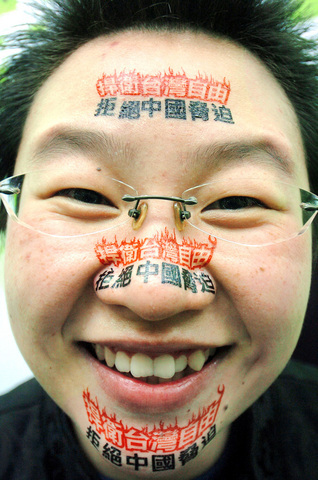President Chen Shui-bian's (
While the Democratic Progressive Party's (DPP) legislative caucus praised the president's decision as evidence of his wisdom, the pan-blue alliance said that the decision is nothing but populism and that it will only belittle the nation's status.
DPP caucus whip Lai Ching-teh (

PHOTO: GEORGE TSORNG, TAIPEI TIMES
"The caucus highly appreciates the president's decision to attend the march," Lai said. "Participating in the event but not addressing the crowd is not only sound judgment but also evidence of his political wisdom."
BULLIED
Despite opposition parties' criticism of Premier Frank Hsieh (
"In the face of China's Anti-Secession Law, every Taiwanese person, including government employees, is upset by China's bullying behavior and they have the absolute right to voice their displeasure," Wu said.
TSU caucus whip Lo Chih-ming (
"The president should take advantage of the opportunity to send a strong message to the international community that we oppose the Anti-Secession Law on behalf of the 23 million people of Taiwan," he said. "It sounds a little bit weird for the president to participate in the march but not address the crowd."
People First Party (PFP) Legislator Lee Yung-ping (
"It is a rare phenomenon for the head of state to take to the streets," she said. "It might lead the international community to think that Taiwan is part of China and that Taiwanese leaders have to stage a protest to have their voices heard."
Lee also questioned whether Chen's decision was aimed at courting pro-independence voters, some of whom have vowed to switch their support to the TSU, following a meeting between Chen and PFP Chairman James Soong (
"His decision not only tramples on the national interest, it also creates more problems," she said.
Another PFP Legislator Hwang Yih-jiau (
"If that is the case, political confrontation between the pan-blue and pan-green is expected," he said.
Chinese Nationalist Party (KMT) caucus whip Chen Chieh (
"While Taiwan is an independent sovereign state, what does a Chinese law have anything to do with us, and why are our president and premier so nervous about it?" he said. "If their taking to the streets helps solve the problem, I am all for it, but I seriously doubt it."
`A JOKE'
Chen Chieh also called on the president and premier to spend more time contemplating how to better people's livelihoods and public security.
Another KMT lawmaker, Tsai Chin-lung (
"It is a joke that the premier encourages his ministers to go to a demonstration," he said. "I had originally planned to go, but now I've change my mind."
Meanwhile, a coalition of foreign residents gathered on the square inside the legislative compound and chanted slogans to voice their support for Saturday's march.
Michael Fahey, an American, said that it is not necessary at this point to do anything more dramatic than stage a demonstration.
"People have criticized this march as not having a specific goal, but I think that the most important thing is to make sure that the international community hears Taiwan's voice. I think that is the main point," he said.
Fahey last week began asking other foreign residents of Taiwan to join Saturday's march through the Web site forumosa.com.
Interested people are welcome to meet up at the side gate of National Taiwan University at 1pm tomorrow.

An essay competition jointly organized by a local writing society and a publisher affiliated with the Chinese Communist Party (CCP) might have contravened the Act Governing Relations Between the People of the Taiwan Area and the Mainland Area (臺灣地區與大陸地區人民關係條例), the Mainland Affairs Council (MAC) said on Thursday. “In this case, the partner organization is clearly an agency under the CCP’s Fujian Provincial Committee,” MAC Deputy Minister and spokesperson Liang Wen-chieh (梁文傑) said at a news briefing in Taipei. “It also involves bringing Taiwanese students to China with all-expenses-paid arrangements to attend award ceremonies and camps,” Liang said. Those two “characteristics” are typically sufficient

A magnitude 5.9 earthquake that struck about 33km off the coast of Hualien City was the "main shock" in a series of quakes in the area, with aftershocks expected over the next three days, the Central Weather Administration (CWA) said yesterday. Prior to the magnitude 5.9 quake shaking most of Taiwan at 6:53pm yesterday, six other earthquakes stronger than a magnitude of 4, starting with a magnitude 5.5 quake at 6:09pm, occurred in the area. CWA Seismological Center Director Wu Chien-fu (吳健富) confirmed that the quakes were all part of the same series and that the magnitude 5.5 temblor was

The brilliant blue waters, thick foliage and bucolic atmosphere on this seemingly idyllic archipelago deep in the Pacific Ocean belie the key role it now plays in a titanic geopolitical struggle. Palau is again on the front line as China, and the US and its allies prepare their forces in an intensifying contest for control over the Asia-Pacific region. The democratic nation of just 17,000 people hosts US-controlled airstrips and soon-to-be-completed radar installations that the US military describes as “critical” to monitoring vast swathes of water and airspace. It is also a key piece of the second island chain, a string of

The Central Weather Administration has issued a heat alert for southeastern Taiwan, warning of temperatures as high as 36°C today, while alerting some coastal areas of strong winds later in the day. Kaohsiung’s Neimen District (內門) and Pingtung County’s Neipu Township (內埔) are under an orange heat alert, which warns of temperatures as high as 36°C for three consecutive days, the CWA said, citing southwest winds. The heat would also extend to Tainan’s Nansi (楠西) and Yujing (玉井) districts, as well as Pingtung’s Gaoshu (高樹), Yanpu (鹽埔) and Majia (瑪家) townships, it said, forecasting highs of up to 36°C in those areas